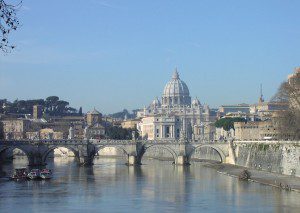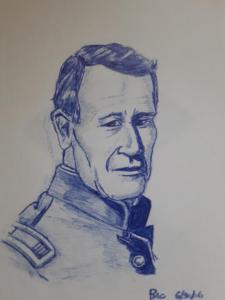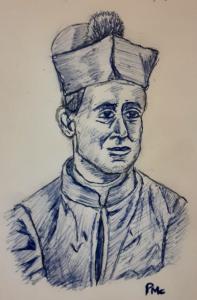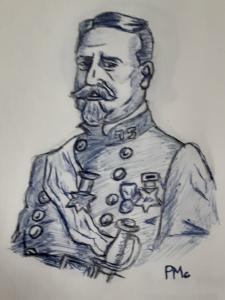Georginia Pell Curtis’s 1909 anthology Some Roads to Rome offers a series of first-hand accounts of Catholic converts. The following is the story of an unidentified U.S. Army officer who embraced Catholicism. His account of going to Confession during the Philippine War is quite interesting, and sheds some light on the real universality of the Church. This entry is part of an ongoing series on Catholic converts in McNamara’s Blog.
AN ARMY OFFICER
For generations, so far back as I have been able to learn, my ancestors have been members of the Episcopal Church. My grandfather had entered the ministry, and shortly after his ordination had married and as a missionary had floated down the Ohio river on a raft, very early in the nineteenth century, landing at Cincinnati, and founding the first Episcopal church in that place, afterwards known as St. Paul’s. My grandmother survived him many years and with her we frequently visited, when my father, an Army Officer, was absent during the Civil War, or on the frontier. She had Puritanical notions of the holiness of the Sabbath, never served meals cooked on that day, never permitted any recreation or amusement, and made of it in her misguided zeal a day of gloom and dread for her grandchildren.
I can remember my father’s frequent assertion that he had sympathized with the ” Know-Nothing” movement, as he considered Catholics in a class with foreigners, and that the government might be endangered if any Catholic obtained office or responsibility. My mother, too, had been raised in a family that had long been satisfied with the Episcopal church. Ours was a very happy family. My father had remained in the Army after the Civil War. When I was about twelve years old a cloud came over the family life. My mother attended service at a little Catholic church in a western city, and seemed impressed. It was, in the estimation of our family traditions, equivalent to the voluntary exposure of oneself to the contamination of leprosy.
There had never been any false sympathy in my family with High Church doctrines or practices. At that time it would have sounded like rank heresy to call one’s minister a priest, or to place within the sanctuary anything more than a pulpit, a chair and table. To be sure, we daily said in our creed that we believed in the Communion of Saints, but no one ever thought what it meant. The sermon was the most important part of our service. We met to hear an eloquent discourse, not too doctrinal, but comforting in our delusion, or to hear a well-trained choir. If anyone had suggested the idea of worship, or a sacrifice, he would have been thought a “Papist.”
Shortly after my mother’s visit to the Catholic church, we moved to Cincinnati, and there she was instructed by the brother of the local Archbishop, John Purcell. One of my grandmother’s neighbors was Mrs. Sarah Peter, a very pious widow, a convert. She was my mother’s first acquaintance in the Catholic Church, and no doubt assisted her with advice and good books. At the Catholic Church I can remember well looking on a devotional congregation in attendance at Benediction, while I enjoyed the fragrance of the incense which ascended from the Altar. I then observed for the first time that the congregation was kneeling most of the time instead of being seated; that the benches on which they knelt seemed more important than the seats of which they formed a part. Prayer almost entirely replaced the sermon as the essence of the service.
After a few months of instruction my mother was received into the Church by the late Archbishop Purcell. In her zeal she endeavored to bring my father into her new church, but used no secret influence over her children. However, her example was sufficient to induce us, without appreciation of the seriousness of the step, to proclaim our desire to become Catholics also. My father’s relatives, shocked by my mother’s conversion and believing it their duty to save the children from their mother’s fate, persuaded him to enter the children in Episcopal boarding schools, where they would be beyond my mother’s example or control, and their attachment to her religion might be stifled in time.
She made no attempt to have me enter the Church, as that was so contrary to my father’s wishes. But she was exact in the performance of her religious duties, and she endeavored, as she said, to atone for so many years out of the Church by a generous practice of its devotions. She attended Mass early each morning and for propriety’s sake, took me as her escort. I well remember being dragged very unwillingly by her all over the city one Holy Thursday, while she visited each church in the city on foot.
I was too young to understand the services, but the sermons surprised me, and I began to study my (Protestant) Bible, and to compare the texts which seemed to sustain the Church. I may add that I have never had a Catholic Bible, and have rarely seen one; but I found sufficient in the Bible issued by the American Bible Society, to shake my faith in the church in which I had been brought up, and to convince me of the Apostolic sanction of sacraments and doctrines which I learned were held by the Catholics, but denied or ignored by the sects. After a year she was taken ill with brain fever and died at a comparatively youthful age.
I was then only sixteen. I would have been denied my father’s permission to enter the Catholic Church, had I asked it, as he was very bitter in his belief that my mother’s conversion had ruined her life and broken up the family’s happiness. But while I had learned enough to shake my faith in any Protestant sect, my attachment to the Catholic Church was not such as to prompt me to join it. I realized that it would cost some effort to comply with its discipline and live up to the Faith conscientiously, and I failed to appreciate what a help its Sacraments would prove in such effort. While I continued to use my Catholic prayer-book and occasionally visited a Catholic church, my faith was being lulled to sleep by the growth of doubts concerning the Divine origin of any religion.
I attended all churches, especially those where eloquent sermons could be heard; sometimes an Episcopal church with my father or sisters, but more frequently any new sect of which I read in the papers. However, the multiplicity of faiths and practices almost destroyed my confidence in any. Even within the Episcopal church I found in one or two cities congregations which I believe my late grandfather would hardly have recognized as orthodox fellow communicants. One Sunday afternoon, I attended with my sisters, a vesper service at one of the High churches of an eastern city. My father would not go, as he was still loyal to the Low Church, the old-fashioned strictly Protestant branch of his church. The pastor of this High Church was known as Father.
On his altar was a handsome marble statue of the Blessed Virgin, and after the vespers was recited a litany, including supplications to the Blessed Virgin and some of the saints. The congregation bowed the knee in passing the altar, or entering a pew, and used the Sign of the Cross. Incense was also used in the ceremony. Attendance there was a fashionable fad of such Episcopalians as yearned for the forms at least, of the Catholic Church. Preaching was replaced by prayer, and many a Low-churchman who came to scoff, remained to pray.
The church itself was known as that of St. Mary the Virgin. I had heard that Father called his morning service the Mass, and that, upon application, he would listen to individual confessions, but I did not learn that he considered such a practice an indispensable preparation for communion. During this period I gained much information from reading the Lives of the Saints, and stories of conversions to the Faith. I acquired, however, an idea that it was easier to die for the Faith as did the martyrs, than to live in it with the opposition of one’s family as had my mother. This did not make it easy to announce my desires. I was then twenty-one, and was impressed with the responsibility incurred and the necessity of announcing my choice. But I hesitated to hurt my father’s feelings by such action. About this time I was very desirous of securing an appointment to the Army, and I had forwarded my application, which, for lack of influential friends, I felt little confidence of getting. Fully convinced that no other Church offered claims of Apostolic origin to be compared with those of the Catholic Church, I had determined that some day before my death I should become a Catholic; but I wanted to postpone such a step as long as seemed safe. In my anxiety to secure the appointment referred to, I made a vow that if God should see fit to grant me the boon I asked, and for which I had so little reason to hope, I would apply for admission to the Church before joining my regiment. Although such appointments were then very rare, as few vacancies existed and several hundred applications had been filed, I was to my great surprise and pleasure nominated, and after examination, appointed. So I felt obliged to keep my promise and believed that God had decided it was time to take the step I had hoped to postpone indefinitely.
We were spending the summer at a coast resort, and one Sunday I walked to the nearest town and after hearing Mass at a little church, asked the pastor, to whom I was a stranger, to receive me into the Church. Of course he declined, questioning my seriousness and my acquaintance with its faith and discipline. But he invited me to dine with him, and devoted the afternoon to questioning me on the catechism and doctrine of the Church. He was satisfied with my answers, and promised to hear my general confession, and admit me to Baptism and Communion the following Sunday.
I announced my intention to my father, and invited him to be present at my Baptism. He declined, tried to dissuade me from such an act, and pleaded with me to remain loyal to my grandfather’s religion. But I had gone too far to halt, and realized that my conviction of the Divine origin of the Church would render any further delay sinful, as well as a violation of my vow. While my good father, ignorant of the truth, might be saved in the church in which he had been born and lived, I should be judged by the light given me and could never be forgiven for declining its guidance.
So, on the following Sunday, I walked to the little church very early, made my first confession, received conditional Baptism, (an acolyte whom I have never since seen, being my sponsor), and received for the first time the Body and Blood of my Lord Jesus Christ, of which Father ‘s instruction had given me such an inspiration. I had not then a single acquaintance in the Catholic Church, but while such was usually an indispensable requisite for admission to a Protestant congregation, I found no difficulty in worshipping at a Catholic chapel or church, absolutely a stranger to all about me.
I believe such isolation tended to render even more beneficial and salutary the graces bestowed on me by the Sacraments. I could meditate as well in a crowded cathedral as in a vacant chapel. The little red light before the altar drew my thoughts to our Lord alone in the tabernacle, and my loneliness served to render communion of thought and desire with Him more consoling.
For several years my frontier life kept me where a bishop seldom visited, so it was some time before I was confirmed. Although at my Baptism I was thoroughly convinced of the historical claims of the Church, and understood sufficient of her doctrine to warrant my admission, I did not then understand or appreciate all the beautiful devotions permitted and encouraged as a stimulus to zeal. But none of the questions which deter some Protestants from entry into the Church ever embarrassed me. Once convinced that I had found the Church founded by our Lord, I was ready to accept without question anything taught by His representatives having His authority. I believed in the Divine origin of the Church, and as for the rest was ready to cry, “Help Thou my unbelief.”
During the guerrilla warfare waged by Philippine insurgents, when soldiers were frequently captured or killed when caught outside our lines, I attended Mass in a town not garrisoned by our troops, kneeling among a hostile people among whom were insurgents in disguise, and with a revolver in every belt, making my confession to a native priest who was doubtless a secret agent, or spy of the insurgents. I would not as a soldier, have trusted him behind my back outside the church. Yet in his church, and aside from his political and my official status, he was a priest of God, and I a penitent Catholic. While either might have been called upon to capture or kill the other outside that building, all strife was forgotten in presence of the Prince of Peace. It was a striking example of the universality of the Church. If thinking Protestants could only travel and see the miraculous results of the efforts of the Church to comply with the command of Christ to “teach all nations”; if they only reflect that no other creed or code has been taught to all nations, any doubt of the Apostolic origin of our holy religion will be dispelled.
Since my Confirmation, years of happy participation in the Sacraments and devotional exercises of the Church, a pious Catholic wife, the training of virtuous children, and God’s almost miraculous assistance in many crises, have convinced me that my life would have been idle and useless had I resisted the prompting of my conscience when called to leave the religious affiliation of all my family and friends. The peace and consolation I have found should have been purchased at the expense of trials and persecution. But I have no such merit. The step that seemed so momentous caused no pain. My father was soon reconciled to my decision and my only sorrow has been that my example has been fruitless, and none of my family has followed me into that haven of rest from doubt and anxiety which God’s one true Church has proved to be.
Surely His promise has been kept. His way is easy and His burden light.
Georgina Pell Curtis, ed., Some Roads to Rome in America: Being Personal Records of Conversion to the Catholic Church (St. Louis: B. Herder, 1909), 1-14.












